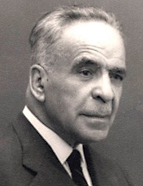

Regarding his school years, the best biographical information about Hernâni Cidade comes from notes that he himself drew up at Vitorino Nemésio ’ s request or from direct family knowledge. Born to farm overseer who also became a blacksmith – “ this city sprang from the orchestra of the saw and the mallet ” – and who had a feel for poetry, Hernâni, more inclined to school than strong enough to work in the fields or in his father ’ s workshop, studied at the Évora Seminary, feeling there the “ enormous joy of a great faith ” . A remarkable student who was able to inspire the other young people of Évora in 1906 with his pro-republican speeches, he could have entered the Gregorian University in Rome, but having already read enough to colour his view of the world, he preferred to pursue secular studies.
Moving away from the Serra de Ossa, which he would describe in the second volume of his Guia de Portugal [Portugal Guide] (1927, pp. 89-90), he enrolled in the Higher Degree in Humanities, while working nearby as the prefect of the Colégio Calipolense. During the programme, he took the option that qualified him to teach, when the transition to the Faculdade de Letras [ School of Arts and Humanities ] was already underway. He candidly recalls – after all, it was a text in honour of Teófilo Braga – that the classes taught by the man he would succeed twenty years later were precisely the least interesting: “ we all preferred the expository brilliance of Silva Cordeiro, the solid science and shrewd observation of Adolfo Coelho, the lucidity and friendly power of communication of Oliveira Ramos, the didactic efficiency of David Lopes, the poetry with which the beautiful voice of Silva Teles enlivened his busy tectonics with drama, even the very clarity with which, in lessons lasting no more than fifteen minutes, Queirós Veloso saved the effort that would enable him to become the future historian that he was ” ( Século XIX. A revolução cultural em Portugal e alguns dos seus mestres , 1961, p. 136). He would not be a classmate of Fernando Pessoa, who had stopped attending classes in 1907, but he still saw him in the library of the Convent of Jesus, heard him read poems by Pessanha and was able to socialise with the Brasileira group in Chiado and Martinho, where he was also welcomed by Sá-Carneiro and Almada. He soon realised Pessoa ’ s genius, as can be seen from his comment on the Literary Survey promoted in 1912 by Boavida Portugal – Cidade had been chosen to close the responses due to his “ outstanding career ” as a student of Humanities, and this was , in fact , his first published intervention (published in a book in 1915: pp. 268-281). Twenty-five years later, he would be a pioneer in studying the poet of Mensagem [Message] in an academic context, alongside other recent poets ( see “ Tendências do lirismo contemporâneo. Do Oaristos às Encruzilhadas de Deus ” [Trends in Contemporary Lyricism. From Oaristos to the Crossroads of God ] , Boletim de Filologia , 5, 1938, 199-228).
This work is financed by national funds through FCT - Foundation for Science and Technology, I.P, in the scope of the projects UIDB/04311/2020 and UIDP/04311/2020.
